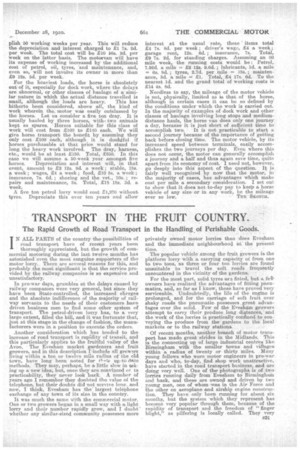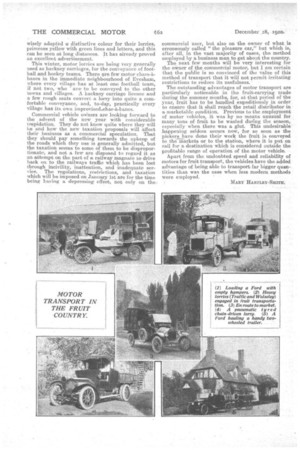TRANSPORT IN THE FRUIT COUNTRY.
Page 17

Page 18

If you've noticed an error in this article please click here to report it so we can fix it.
The Rapid Growth of Road Transport in the Handling of Perishable Goods.
IN ALL PARTS of the country the possibilities of road transport have of recent years been thoroughly appreciated, but the growth of commercial motoring during the last twelve. months has astonished even the most sanguine supporters of the motor lorry. There are several reasons for this, and probably the most significant is that the service provided by the railway .companies is so expensive and
unsatisfactory. .
In pre-war days, grumbles at the delays caused by railway companies were very general, but since they have been State-controlled, the increased charges and the absolute indifference of the majority of railway servants to the needs of their customers have driven business men to find some other system of transport. The petrol-driven lorry has, to a very large extent, filled the bill, and it was fortunate that, Just at this stage in the change of fashion, the manufacturers. were in a position to execute the orders. Another consideration which has tended to the increase of road transport is rapidity of transit, and' this particularly applies to the fruitful valley of the Avon. The Evesham market gardeners and fruit growers, and in this description I include. all groisers living within a ten or twelve mile radius of the old town, have long been noted for tl...eir up-to fiRte methods. They may, perhaps, be a little slow in wklug ap a new idea, but, once they are convinced of ts practicability, they never look back. A number of years ago I remember they doubted the value of the telephone, but their doubts did not survive lone.. and now, I think, Evesharn has the largest telephone exchange of any town of its size in the cone try. It was much the same With the commercial motor. One or two growers began in a small way with a, light lorry and their number rapidly grew, and I doubt' whether any similar-sized community possesses more privately owned motor lorries than does Evesham and the immediate neighbourhood at thepresent timThe.e popular vehicle among the fruit growers is the platform lorry with a carrying capacity of from one to two tons, as three or four ton lorries are found unsuitable to travel the soft roads frequently encountered in the vicinity of the gardens. For the most part, solid tyres ara. fitted,, but a feii, owners have realized the adVantages of fitting pneumatics, and, so far as I know, these have proved Very serviceable. Undoubtedly, the life of the engine is prolonged, and for the carriage of soft fruit over shaky roads the pneumatic. possesses. great advantages over the solid. Few of the Evesham growers attempt to carry their produce long dista.nces,'.and the work Of the lorries is practically confined to conveying the produce from the gardens to the local markets or to the railway stations. Of recent months, another branch of motor transport has made great strides in the Midlands. This is the connecting up of large industrial centreslike Birmingham with the smaller towns and viaagcs within a radius of twenty or thirty. miles. Many young fellows who were motor engineers in pre-war days and who to-day, find shop work unattractive, have started in the road transport business, and are doing very well. One of the photographs is of two lorries running daily from Eveshaan to Birmingham and back, and these are owned and driven by two young men, one of whom was in the Air Force and the other on aeroplane and airship engine construction. They have only been running for about six months, but the system which they represent has become very popular through them, because of the rapidity of transport and the freedom of "finger blight, as pilfering is locally called. They very wisely adapted a distinctive colour for their lorries, primrose yellow with green lines and letters, and this can be seen at long distances. It has already proved an excellent advertisement.
This winter, motor lorries are being very generally used as hackney carriages, for the conveyance of football and hockey teams. There are few motor chars-abanes in the immediate neighbourhood of Evesham, where every village has at least one football team, if not two, who ' aye to be conveyed to the other towns and villages. A hackney carriage licence and a few rough seats convert a lorry into quite acomfortable conveyance,and, to-day, practically every village ha S its own irnprovisedichar-à-bancs.
Commercial vehicle miners are looking forward to the advent of the new year with considerable trepidation. They do not know quite where they will be and how the new taxation proposals will affect their business as a corninercial speculation. That they should pay something towards the upkeep of the roads which they use is generally admitted, but the taxation seems to some of them to be disproportionate, and not a few are disposed to regard it as an attempt on the part of a railway magnate to drive back on to the railways traffic which has been lost through incivility, inattention, and inadequate service. The regulations, restrictions, and taxation which will be imposed on January 1st are for the time being having a depressing effect, not only on the commercial user, but also an the owner of what is en.oneously called "the pleasure car," but which is, after all, in the vast majority of cases, the method employed by a business man toget about the country.
The next few months will be very interesting for the ceivner of the commercial motor, but 1 am certain that the public is so convinced of the value of this method of transport that it will not permit irritating restrictions to. reduce its usefulness. • The outstanding advantages of motor transport are particularly noticeable in the fruit-carrying trade during the summer months, for, at that period of the year, fruit has to be handled expeditiously in order to ensure that it shall reach the retail distributor in a marketable condition. Previous to the employment of motor vehicles, it was by no means unusual for many tons of fruit to be wasted during the season, especially when there was a glut. This undesirable happening seldom occurs now, for so soon as the pickers have done their work the fruit is conveyed to the markets or to the station, where it is put on rail for a destination which is considered outside the profitable range of operation of the motor vehicle.
Apart from the undoubted speed and reliability of motors for fruit transport, the vehicles have the added adVantage of being able to transport far bigger quantities than was the ca-se when less modern methods were employed.
MARY HARTLEY-SMITII.






























